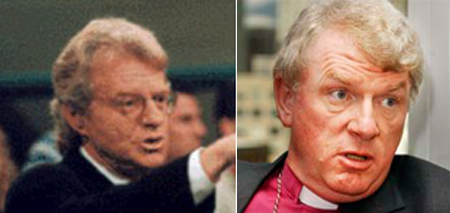In Evelyn Waugh’s wonderful novel, Men at Arms, our hero, Guy Crouchback, finds himself out of step with his time and the children of his time; they were not simpatico:
He was accepted and respected but he was not simpatico. Gräfin von Gluck, who spoke no word of Italian and lived in undisguised concubinage with her butler, was simpatica. Mrs. Garry was simpatica, who distributed Protestant tracts, interfered with the fishermen’s methods of killing octopuses and filled her house with stray cats.
Guy’s uncle, Peregrine, a bore of international repute whose dreaded presence could empty the room in any centre of civilization—Uncle Peregrine was considered molto simpatico. The Wilmots were gross vulgarians; they used Santa Dulcina purely as a pleasure resort, subscribed to no local funds, gave rowdy parties and wore indecent clothes, talked of “wops” and often left after the summer with their bills to the tradesmen unpaid; but they had four boisterous and ill-favoured daughters whom the Santa-Dulcinesi had watched grow up. Better than this, they had lost a son bathing from the rocks. The Santa-Dulcinesi participated in these joys and sorrows. They observed with relish their hasty and unobstrusive departures at the end of the holidays. They were simpatici. Even Musgrave who had the Castelletto before the Wilmots and bequeathed it his name, Musgrave who, it was said, could not go to England or America because of warrants for his arrest, “Musgrave the Monster,” as the Crouchbacks used to call him—he was simpatico. Guy alone, whom they had known from infancy, who spoke their language and conformed to their religion, who was open-handed in all his dealing and scrupulously respectful of all their ways, whose grandfather built their school, whose mother had given a set of vestments embroidered by the Royal School of Needlework for the annual procession of St. Dulcina’s bones—Guy alone was a stranger among them.
I can sympathise with Guy’s plight: in fact, as soon as I begin to feel the mildest bout of simpatico insinuating its way into my psyche, a vague sense of unease descends upon me. I freely admit it’s my fault – although, I confess, accompanying the heavy burden of this particular guilt is a profound indifference to it.
Not so for Bishops Bird and Ingham: they are entirely simpatico, united, according to Ingham, by the “shared .. contempt and opposition of the fearful” – otherwise known as people who disagree with them.
From here:
No surprises, either, came when Bishop Ingham acknowledged that the two men also have shared the contempt and opposition of the fearful. The two dioceses, so similar in ideals, face the same challenges of change and adaptation to an emerging world.
At this point Bishop Ingham described the shift in relevance from a time when the church was at the centre of political and national power to the era of Post-Christendom. The next change, the one we are experiencing, is away from the old evangelicalism, liberalism and catholicism. It will not be shaped by the old culture wars that we continue to fight, even, and perhaps most pointlessly, against each other. The future church holds some surprises for those of us so involved in present difficulties that we do not see where we’re going.
I’d like to end on a point of agreement: the last sentence, in this case. They really don’t know where they are going.


